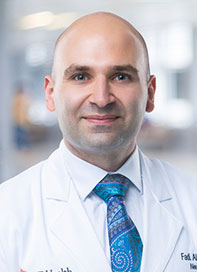When Seconds Count
Stroke occurs when blood flow to your brain is blocked. When blood flow is blocked, brain cells begin to die within minutes. That’s why every second counts during a stroke. The University Hospital rapid response stroke team goes into action the minute you arrive at our emergency department. The sooner you get treatment means the less brain damage that occurs.
Signs of a Stroke
According to the American Heart Association/American Stroke Association, signs and symptoms of stroke include these sudden changes:
- Numbness or weakness of the leg, arm or face
- Confusion or trouble understanding
- Trouble seeing in one or both eyes
- Trouble walking, dizziness, loss of balance or coordination
- Severe headache with no known cause
B.E. F.A.S.T. to Save a Life
When you know the signs and symptoms of stroke, you’re better prepared to act quickly. You may save a life – even your own. BE FAST and do these simple tests when you have or see someone with any of the signs of stroke:
B — Balance: Is the person having trouble balancing when they stand?
E — Eyes: Is the person experiencing loss of vision or blurred vision in either eye?
F — Face: Ask the person to smile. Does the face droop?
A — Arms: Ask the person to raise both arms. Does one drift downward?
S — Speech: Ask the person to repeat a simple phrase. Is speech slurred or hard to understand?
T — Time: If you see any of these signs, call 911 immediately.
Risk Factors for Stroke
- High blood pressure is the number one cause of stroke
- Diabetes
- High cholesterol
- Age — your chance of having a stroke nearly doubles every 10 years after age 55
- Gender — Women have more strokes than men, and stroke kills more women than men
- Ethnicity — African Americans have a much higher risk of death from a stroke than Caucasians
- History of prior stroke
- Heart disease and other heart disorders
- Family history of stroke


